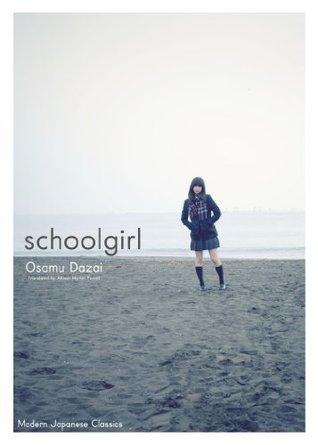Schoolgirl by Osamu Dazai Book Summary
Discover the profound themes and insights of Osamu Dazai's "Schoolgirl" in our comprehensive summary and review. Explore key takeaways and understand the emotional depth of this classic work. Perfect for literature enthusiasts seeking a deeper connection to Dazai's writing.
Schoolgirl Book Summary
Osamu Dazai's "Schoolgirl" offers a haunting glimpse into the mind of a teenage girl navigating the complexities of adolescence in 1930s Japan. This semi-autobiographical novella captures the protagonist's internal struggles with identity, family expectations, and the suffocating nature of societal norms through Dazai's signature introspective style. The story unfolds over a single day, revealing the girl's profound sense of alienation and her desperate search for authentic connection in a world that feels increasingly meaningless. Through its psychological depth and raw emotional honesty, "Schoolgirl" demonstrates Dazai's masterful ability to transform personal anguish into universal literary art.
Discover deeper insights and enhance your reading experience by exploring our detailed From Blood and Ash Book Summary, Review & Key Insights through strategic internal linking.
Schoolgirl by Osamu Dazai - Introduction
I had no idea a story about a seemingly ordinary schoolgirl could unravel such a deep, unsettling look into human nature and societal expectations. When I picked up Schoolgirl by Osamu Dazai, I was honestly just curious about classic Japanese literature—something short and impactful to fit into a busy week. At just 103 pages, it’s a quick read, but it lingers with you far longer than you’d expect.
What really surprised me was how Dazai uses this novella to peel back the layers of youth, innocence, and the subtle pressures that shape who we become. It made me rethink how much of our identity is influenced by the silent rules around us, especially in a culture as complex as Japan’s. The way the story blends fiction with sharp social commentary is quietly powerful.
If you’re someone who enjoys Asian literature, or you’re drawn to stories that are both intimate and thought-provoking, this is definitely for you. It’s perfect if you want a glimpse into Japanese society through a literary lens—something that’s both a classic and a fresh, personal narrative. Plus, if you like short stories or novellas that pack a punch without demanding hours of reading, this hits the spot.
Honestly, reading Schoolgirl felt like having a deep conversation with a friend about things we don’t usually talk about—identity, conformity, and the bittersweet awkwardness of growing up. I think you’d really connect with it.
What is Schoolgirl About?

"Schoolgirl" by Osamu Dazai explores the inner turmoil and existential crisis of a young girl navigating the complexities of adolescence and societal expectations. The book's main message highlights the struggle between personal identity and societal roles, emphasizing the pain of feeling misunderstood and the quest for authenticity. Key concepts include the conflict between innocence and experience, the impact of societal pressures on mental health, and the search for self-acceptance amidst external judgments. Through vivid introspection, Dazai captures the essence of youthful despair and the longing for connection.
About Book Author - Osamu Dazai
Introducing a voice that truly understands the unspoken. Many know Osamu Dazai for 'Schoolgirl,' but what's fascinating is how he arrived at such profound insight. Osamu Dazai didn't start out as a chronicler of youthful angst; his path was far more winding. I recall learning that his own intense feeling of dislocation from the world around him, a Japan undergoing immense change, became the very wellspring for his empathy.
- A little-known facet of his early life was a deep, albeit brief, engagement with radical thought, which I believe sharpened his eye for societal undercurrents that so often shape individual lives, a theme subtly woven into 'Schoolgirl.' This wasn't academic study; it was lived experience. His ability to articulate the delicate, often turbulent, inner worlds, as seen in 'The Setting Sun' or the stark honesty of 'No Longer Human,' stemmed from a place of deep personal searching. That's why he could so authentically capture the fleeting thoughts and intense emotions of a young girl; he knew what it meant to feel adrift and to observe the world with a keen, almost painful, sensitivity.
More Books To Find
Schoolgirl - Book Overview
It's about a young girl's struggle with her identity and the pressures of society. The protagonist, a schoolgirl, feels trapped between her own desires and the expectations placed on her, reflecting a deep sense of alienation that many can relate to.
Dazai wrote it to explore the complexities of youth and the often suffocating nature of societal norms. He delves into the darker aspects of the human psyche, revealing how these pressures can lead to a sense of hopelessness. It’s not just about a girl in school; it’s about the universal search for meaning and belonging.
What sets it apart from other coming-of-age stories is its raw honesty and psychological depth. Instead of just focusing on personal growth, Dazai dives into the darker corners of the mind, showcasing how mental health and societal pressures intertwine. It feels more like a confession than a narrative.
One moment that stuck with me is when the protagonist reflects on her relationship with her classmates. She feels both connected and isolated, a duality that resonates deeply. It reminded me of how we often wear masks in social situations, trying to fit in while feeling completely alone inside. That emotional tug-of-war really captures the essence of adolescence in a way that lingers long after you finish the book.
Key Insights of Schoolgirl
-
Isolation: The protagonist experiences profound feelings of alienation and disconnect from her peers, highlighting the theme of loneliness in adolescence.
-
Identity Crisis: The narrative delves into the struggle for self-identity, as the schoolgirl grapples with societal expectations and her own desires, reflecting the complexities of growing up.
-
Desire for Freedom: There is a strong undercurrent of longing for freedom and escape from the constraints of societal norms, which resonates with the universal quest for independence during youth.
-
Emotional Turmoil: The story captures the intense emotional experiences of the protagonist, illustrating the turmoil of young love, jealousy, and the search for acceptance, which are pivotal in shaping her worldview.
-
Cultural Reflection: Dazai’s work serves as a critique of post-war Japanese society, examining the pressures placed on young women and the conflict between traditional values and modern aspirations.
Who Should Read This Book
"Schoolgirl" by Osamu Dazai is a must-read for those intrigued by the complexities of adolescence and the struggles of identity. Ideal for young adults and literary enthusiasts, this novella offers a poignant exploration of the inner turmoil faced by a teenage girl in post-war Japan. Readers who appreciate psychological depth and existential themes will find themselves captivated by Dazai's unique narrative style. Additionally, fans of Japanese literature and those interested in the human experience will resonate with the protagonist's journey, making it a compelling choice for anyone seeking insight into the intricacies of youth and self-discovery.
Read If You Are
- Interested in exploring complex psychological themes and existential struggles.
- A fan of Japanese literature and its unique narrative styles.
- Seeking deep character studies that reflect on societal pressures and personal identity.
Skip If You Are
- Looking for a light, cheerful read
- Uninterested in introspective or existential themes
- Expecting a straightforward, plot-driven story
Important Takeaways from this Book
-
Reflect on your feelings: Take 10 minutes today to journal about your current emotions and thoughts. This practice helps you gain clarity and self-awareness, allowing you to understand your motivations and desires better. No prior experience needed—just a quiet space and a pen.
-
Identify your passions: Make a list of five activities or topics that excite you. Choose one to explore further this week. Engaging with your passions can boost your mood and provide a sense of purpose. Consider your current commitments to ensure you can dedicate time to this pursuit.
-
Seek genuine connections: Reach out to a friend or family member you haven't spoken to in a while and invite them for coffee or a chat. Building and nurturing relationships can enhance your emotional well-being and create a support system. Be open to vulnerability and share your thoughts during the conversation.
-
Set a small goal: Choose one personal or professional goal you’ve been putting off and break it down into three actionable steps. Start with the first step today. Achieving small goals fosters a sense of accomplishment and motivates you to tackle larger challenges. Ensure the goal is realistic and aligned with your current priorities.
-
Practice self-compassion: When you feel self-critical, pause and speak to yourself as you would to a friend. Acknowledge your struggles and remind yourself that imperfection is part of being human. This shift in mindset can significantly improve your self-esteem and resilience. Consider setting reminders throughout the day to practice this technique.
Book Review
I picked up "Schoolgirl" by Osamu Dazai expecting a straightforward coming-of-age story, but what I got was a beautifully complex exploration of identity and societal expectations. The narrative is deeply introspective, and Dazai's writing style is both lyrical and haunting, which really drew me in from the first page.
One of the strengths of the book is its vivid portrayal of the protagonist’s inner turmoil. For example, Dazai captures the confusion and anxiety of adolescence with such authenticity that I often found myself reflecting on my own experiences. The way he delves into the protagonist's thoughts about her appearance and societal pressures is painfully relatable, making the character feel incredibly real.
However, I did find the pacing a bit uneven at times. Some sections felt drawn out, which could detract from the overall momentum of the story. A more balanced flow might have kept me more engaged throughout. Additionally, while the introspection is powerful, there were moments where I wished for more external action or dialogue to break up the internal monologue.
In comparison to similar books like "Norwegian Wood" by Haruki Murakami, "Schoolgirl" feels more raw and unfiltered, which can be both a strength and a flaw, depending on the reader's preference.
Overall, I think "Schoolgirl" is a gem for anyone who appreciates deep psychological insights and poetic prose. However, if you prefer fast-paced narratives or more action-driven plots, this might not be the book for you. I found it to be a poignant read that lingers long after the last page, and I would recommend it to those willing to immerse themselves in a character's intricate mind.
Final Thoughts
If I'm being honest, finishing Schoolgirl by Osamu Dazai left me with a mix of emotions. The book paints a vivid picture of a young girl's inner turmoil and societal expectations, which really resonated with me. My overall takeaway is that it beautifully captures the struggle of identity and belonging, something many can relate to.
I'd definitely recommend this if you're someone who enjoys introspective literature or is interested in the complexities of adolescence. However, skip this one if you're looking for a fast-paced plot or a happy ending; it’s more about the journey of self-discovery than a traditional narrative.
The thing that surprised me most was how deeply I connected with the protagonist's feelings of isolation and confusion. It’s a reminder of how universal these experiences can be, regardless of the time period. Months from now, I think the themes of identity and existential angst will stick with me, as they’re so relevant to our lives today.
As for reading it again, I’d opt for the full book over a summary. There’s a richness in Dazai's writing that deserves to be experienced firsthand. Overall, my reading experience was thought-provoking and left me reflecting on my own life choices, which I truly appreciate.
Frequently Asked Questions
How long does it take to read Schoolgirl?
The reading time for "Schoolgirl" by Osamu Dazai, which has 103 pages, typically ranges from 2 to 4 hours, depending on your reading speed. Enjoy immersing yourself in Dazai's captivating prose!
What makes "Schoolgirl" different from other books in this genre?
"Schoolgirl" by Osamu Dazai stands out due to its introspective narrative, blending existential themes with a unique exploration of adolescence. Dazai's lyrical prose and deep psychological insight create a poignant, relatable experience that transcends typical coming-of-age stories, offering a profound reflection on identity and alienation.
Who is the target audience for Schoolgirl
The target audience for "Schoolgirl" by Osamu Dazai includes young adults and readers interested in Japanese literature, psychological themes, and existential exploration. It appeals to those seeking deep emotional insights and reflections on identity, societal pressures, and the complexities of adolescence.
Are there any criticisms or limitations of Schoolgirl
Critics argue that "Schoolgirl" may oversimplify complex themes of adolescence and mental health, potentially alienating some readers. Additionally, Dazai's unique writing style can be challenging for those unfamiliar with Japanese literature, leading to varied interpretations and a limited appeal to a broader audience.
What is the main theme of Schoolgirl by Osamu Dazai
The main theme of "Schoolgirl" by Osamu Dazai revolves around the struggles of adolescence, identity, and the search for belonging. It explores the complexities of youthful emotions, societal expectations, and the feeling of alienation, ultimately portraying the internal conflicts faced during the transition into adulthood.
Tags:
Osamu Dazai, Schoolgirl, Schoolgirl Author, Schoolgirl Book, Schoolgirl Book Description, Schoolgirl Book Rating, Schoolgirl Book Review, Schoolgirl by Osamu Dazai, Schoolgirl ISBN, Schoolgirl Short Summary

Michel Fisher
Michel Fisher is a passionate fiction enthusiast and book blogger who writes about emotional reads, character-driven stories, and contemporary romance authors that captivate hearts and minds.

Schoolgirl
Book Overview
Description
'Schoolgirl' is the novella that first established Dazai as a member of Japan's literary elite. Essentially the start of Dazai's career, the 1933 work gained notoriety for its ironic and inventive use of language, and how it illuminated the prevalent social structures of a lost time.
Key Points
Isolation and alienation
Characters
Publisher
One Peace Books
First Publish Date
07/20/39





